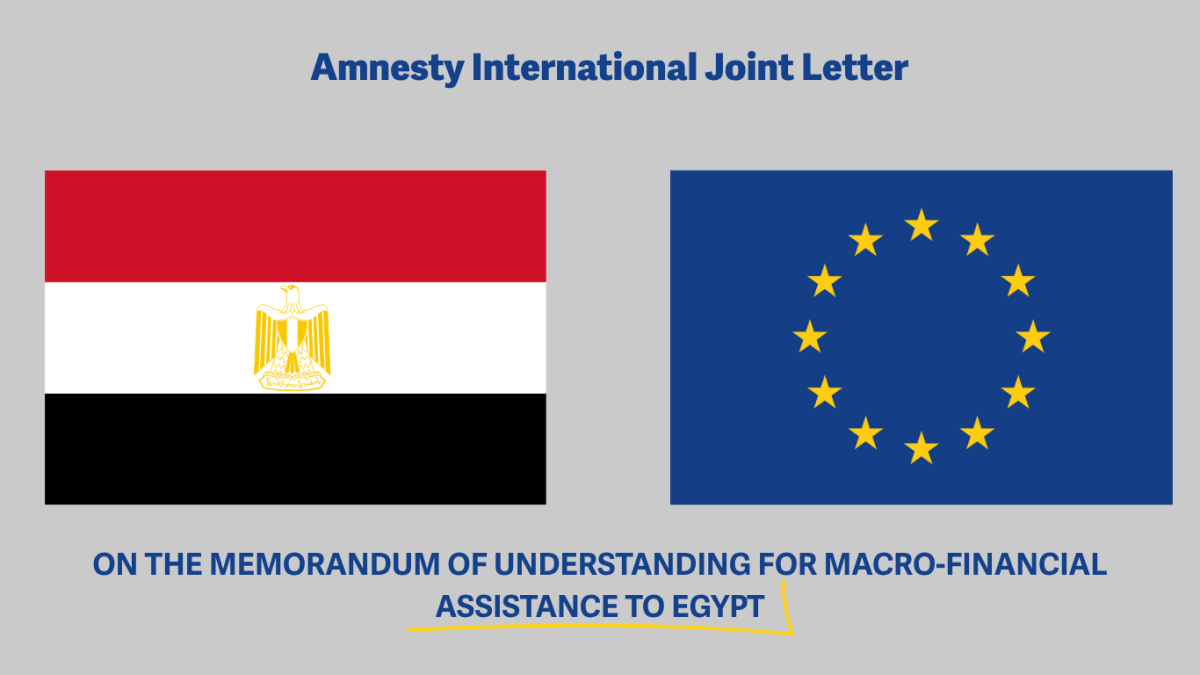JOINT NGO INPUT AHEAD OF NEGOTIATIONS ON THE MEMORANDUM OF UNDERSTANDING FOR MACRO-FINANCIAL ASSISTANCE TO EGYPT
Published: Jul 4, 2025 Reading time: 4 minutes Share: Share an articleWe, the undersigned Egyptian, regional and international human rights organisations, are writing to provide input ahead of the negotiations on the Memorandum of Understanding (MoU) for the EU’s €4 billion Macro-Financial Assistance (MFA) package to Egypt.

We, the undersigned Egyptian, regional and international human rights organisations, are writing to provide input ahead of the negotiations on the Memorandum of Understanding (MoU) for the EU’s €4 billion Macro-Financial Assistance (MFA) package to Egypt.
Article 3 of the decision by the European Parliament and Council on granting MFA to Egypt states that: “The Commission... shall agree with the Egyptian authorities on clearly defined economic policy and financial conditions... to which the Union's macro-financial assistance is to be subject, to be laid down in a Memorandum of Understanding...”.
We recognize the EU’s objective of supporting Egypt’s economic stabilization, as reflected in the decision to provide this substantial assistance—the second-largest MFA operation after that granted to Ukraine. However, this decision marks a departure from the EU’s usual standards for recipient countries, which according to EU guidelines on MFA, include prior “respect for human rights and effective democratic mechanisms.”
Notably, Article 2(1) of the aforementioned decision deviates from past practice and established guidelines by stating: “A pre-condition for granting the Union's macro-financial assistance shall be that Egypt continues to make concrete and credible steps towards respecting effective democratic mechanisms – including a multi-party parliamentary system – and the rule of law and guarantees respect for human rights.”
In addition, Article 4 (3.A) states: “The Commission shall decide on the release of the instalments subject to the fulfilment of the following conditions: (a) the pre-condition set out in Article 2(1).”
Article 2(2) adds: “The Commission services and the European External Action Service shall monitor the fulfilment of this pre-condition throughout the life cycle of the Union's macro-financial assistance.”
We therefore urge the European Commission to ensure that this assistance strictly adheres to these conditions and advances socioeconomic rights by:
1. Incorporating the Following Reforms into the MoU:
- a. Increasing government spending on education from 1.72% of GDP in the 2024–2025 fiscal year to the constitutionally mandated 6% of GDP.
- b. Increasing government spending on healthcare from 1.17% of GDP in the 2024–2025 fiscal year to the constitutionally mandated 3% of GDP.
- c. Expanding social protection programs such as Takaful and Karama to be universal rather than targeted. These programmes should be indexed to the national poverty line and regularly adjusted for the cost of living to ensure they effectively reach all individuals living in or near poverty.
2. Adopting a Framework for Assessing Egypt’s Fulfillment of the Pre-Condition
We urge the European Commission to work with the Government of Egypt to identify time-bound, concrete, clear, and measurable indicators to assess Egypt’s fulfillment of the relevant pre-conditions prior to the disbursement of each instalment.
To support this effort, we have provided two annexes:
• Annex A: Key indicators of progress for rule of law and human rights. At a minimum, the Commission should ensure that Egypt agrees to carry out reforms to:
- End censorship and judicial harassment of independent media and allow free access to blocked websites;
- Reduce the number of crimes punishable by death;
- End the misuse of pretrial detention against critics;
- Lift asset freezes and travel bans against human rights defenders.
In the medium-term:
- Enact legislation criminalizing all forms of violence against women;
- Implement comprehensive reforms to the Code of Criminal Procedure;
- Repeal provisions in the recently adopted Asylum Law that contradict Egypt's international legal obligations;
- Launch an inclusive consultation process to develop a genuine National Human Rights Strategy for 2026–2030, with meaningful participation from independent human rights organizations and defenders.
• Annex B: A non-exhaustive list of individuals detained for peacefully exercising their rights. Their release would signal credible progress.
3. Robust Monitoring of the Pre-Condition
To ensure effective oversight, we call on the European Commission to:
· Publish annual written assessments of Egypt’s progress (both in legislation and in implementation), and promptly share them with the relevant European Parliament committees and Council working groups;
· Involve Egyptian civil society and relevant UN bodies in the monitoring process through structured channels.
We remain ready to engage in further dialogue on this matter.
Signatories
Association for Freedom of Thought and Expression (AFTE)
Cairo Institute for Human Rights Studies (CIHRS)
Committee to Protect Journalists
Egyptian Commission for Rights and Freedoms
Egyptian Front for Human Rights (EFHR)
Egyptian Human Rights Forum (EHRF)
Egyptian Initiative for Personal Rights (EIPR)
FairSquare
HuMENA for Human Rights and Civic Engagement
People in Need
Refugees Platform In Egypt (RPE)


